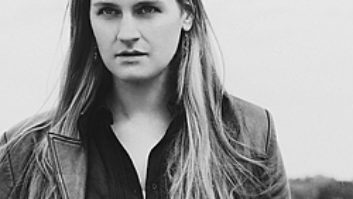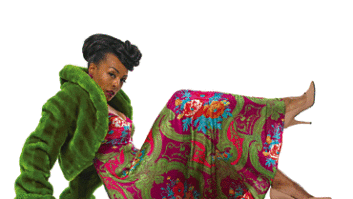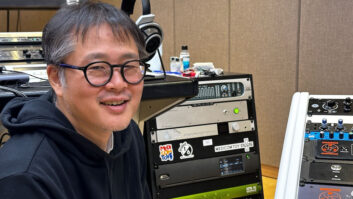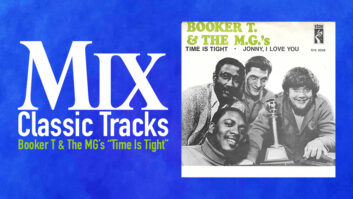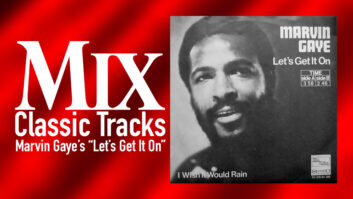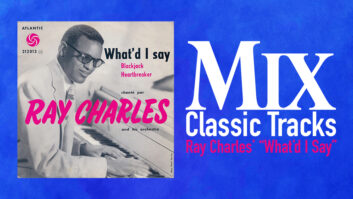Nowadays, funk music comes in a multitude of forms, ranging from ol’ skool R&B to rap and hip hop, modern rock, jazz, Latin and even world music. None of those styles, however, seems to aptly pinpoint Meshell Ndegeocello’s broad musical explorations. Vocally, she is only a little easier to categorize, for the artist is neither a sexy chanteuse nor a high-energy screecher. Instead, her tones rumble and resonate through biting lyrics, boldly expressing sensuality along with a sophisticated progressive social/political consciousness.
Devoted fans love Ndegeocello’s distinctive style and uncompromising attitude. On the other hand, some music retailers and radio/TV outlets are far from enamored with the rebellious musician. From their standpoint, she doesn’t generate high-volume sales, and her material isn’t conducive to the airwaves. In 1993, she actually had a moderate hit with the single “If That’s Your Boyfriend (He Wasn’t Last Night)” from her debut CD, Plantation Lullabies. Subsequent releases, such as the raucous fusion romp Peace Beyond Passion in 1996 and the lush, string-adorned Bitter from 1999, weren’t top sellers, but they garnered critical raves all over the world.
Unfazed by her chart history, the bassist/singer — who also plays keyboards and guitar — continues to create her highly individualized funk style. Her latest release is titled Cookie: The Anthropological Mixtape, which she co-produced with her guitarist Allen Cato. Ndegeocello, while staying at the Chelsea Hotel in New York during a tour, explains the concept of the project: “I grew up with mix tapes that your friends would make for you with all the stuff they wanted you to hear. So I wanted to make [an album] with that kind of feeling. It’s just a mix tape that I’m hoping people will share with their friends.”
That description understates the power and artistry of the challenging work she and Cato have created. It’s definitely a collection of songs, but it also includes spoken-word sound bites from Angela Davis and Talib Kweli. Combined with Ndegeocello’s high-powered funk, it’s probably a far cry from what the average listener would compile. Then again, there’s nothing average about the musician, who’s both a monster bassist and impassioned poet herself. “I wanted to deal with being on the porch in Alabama, at the club in New York, on another planet, to being thrown into the past,” she elaborates. “I just wanted it to be a journey, like a quantum leap into wherever you need to go. Musically, it’s Bitches Brew meets Master P, or A Tribe Called Quest meets Stevie Wonder.
“I don’t really compare my work [to other CDs]. This is just the fourth chapter in my memoir,” she continues, describing her records. “They’re all just chapters, and I want each one to be different and more exciting. The intentions of the music are just to show where I am at this time. My only sonic intention, though, was to make something that you just want to play really loud. Most of my records are like you’re sitting in the bed with me while I tell you all my shit. But for this one, I wanted it to feel like you were with me on the journey and not be so introverted or closed.”
The place where she embarked on her journey was Hyde Street Studio, an analog facility situated in the gritty Tenderloin district of San Francisco. Ndegeocello, who resides in nearby Berkeley, cites Hyde Street’s vibe, rich history and location as prime factors for choosing the studio. “They did a Headhunters record there and also a Hieroglyphics record there,” she says. “It was an intense and unusual place and I had a great time there.” Cookie… was recorded at Hyde Street over the course of a month beginning in June 2001. Sessions included some live tracking, but tracks were primarily stitched together from overdubbed elements.
“Every song is different,” Ndegeocello says. “I pretty much play just about everything, so I like to start with a good foundation first, where it’s just me and the drummer. I make records like Roger Troutman, and just get the beat up and add everything else. I make loops, but they’re like 16 or 32 bars, so they have a little more ebb and flow. Then we put live stuff over that and try to maintain live elements. From there, we piece everything together and work out the colors.
“But on the jazz section for ‘Criterion,’ we just all played together and then spliced that into the tune. The first song [“Dead Ni**a Blvd. (Pt. 1)”] is my Master P influence, and the second tune [‘Hot Night’] is my early Tribe Called Quest influence. I’m kind of referencing everybody in my head and giving respect to them, and yet be myself. Because this album is a mix tape, I wanted everything to be different and bring about a whole other feeling. To me, this is just a Hennesy and Sprite record.”
Although the Washington, D.C. native (born Michelle Johnson) has strong links to R&B, pop and even rock, she considers herself a jazz bassist first. Like most players of the improvisational genre, she truly loves to jam with kindred musicians. Yet she refrains from trying to capture the spontaneity of her live shows when recording. Her philosophy, which she says she adopted from the group Steely Dan and from David Gamson, producer of her first two CDs, is: “Making records is different than making music.” In other words, she thoroughly enjoys the controlled environment of a studio and its possibilities, whereas live performances, while exciting and beautiful, are fleeting and exist only in those moments.
“Live, with all the incredible players, everyone is pretty much free, and things are kind of allowed to take on a shape of their own,” states Cato, who’s also been her guitarist for the past five years. Cookie… was his first time working in a leadership capacity with Ndegeocello for a full-scale project. Previously, they had worked together on soundtracks, but those activities were not as involved as this endeavor. “It was drastically different,” he stresses from his home in Dallas. “I was a filter and buffer sometimes, and she would bounce a lot of her ideas off of me.
“Between the creative and technical aspects, wearing two hats [guitarist and co-producer] can be confusing. They don’t always necessarily mesh. It was little harder for me to be objective, but we found ways to deal with that. We were also under the gun to meet the label’s release date, which ended being almost a year later [than originally planned]. We did a little bit of everything in the studio. There was a lot of live playing with her interacting with some of the guys, and also overdubbing and a considerable amount of programming. We pretty much ran the gamut as far as recording methods were concerned.” The other players on the album include guitarist Kid Funkadelic, singer Lalah Hathaway, bassist/bass clarinetist Marcus Miller, tenor sax man Jacques Schwarz, drummer Oliver Gene Lake, keyboardist Federico Gonzalez Peña, harmonica player Gregoire Maret and percussionist Alfredo Mojica.
Ndegeocello, Cato and engineer Erik Dyba cut the CD in Hyde Street’s “A” room, which is based around a modified Neve 8048 console with Flying Faders automation. The studio also has Studer analog recorders, Panasonic DATs, a fine mic collection and plenty of analog signal processing equipment. Most of the recording was to Logic Audio; though Cato is conversant in Pro Tools, he prefers the Logic format because of its displays and MIDI capabilities. But for some of the crucial sessions, he and Dyba opted to use good ol’ 2-inch tape. “I didn’t just want to trust everything going to hard disk, especially when you’re bringing people across the country,” Cato says. “I love hard disk recording and think it’s moving the process and industry ahead. But I don’t think it’s a totally proven medium yet. Like a lot of people out there, I’m familiar with and have experienced ‘digital hell.’”
Ndegeocello, who briefly studied audio engineering in Silver Springs, Md., understands the capabilities of hard drive systems but doesn’t know how to operate them. Her introduction to digital recording came early in her career through her first two CDs with producer Gamson. She speaks highly of her former producer, who, along with David Frank, she calls, “the fathers of the MIDI R&B sound.” “[Gamson] had Pro Tools before the motherf****** even worked, and he manipulates it better than anyone I know,” she says. “Through him, I grew up on the computer and learned how to make music.
“But Cato crazily works Pro Tools and MIDI programming, too. I call him ‘Getron,’ because he’s ghetto and electronic at the same time.” The co-producer, who was born in Kansas City and has worked with Chaka Khan and others, sees himself as more of a facilitator than a visionary. He has a close relationship with Ndegeocello and feels that being flexible is of the utmost importance when working with her. “She really is a free spirit, creative and extremely prolific,” Cato says. “The technical aspect of these things can block that sometimes. Being a musician myself, I can understand what that is like. So I tried to create an atmosphere where we could flow and make the technical aspects as much of a non-issue as I could for her.”
Final modifications and mixing of Cookie… were handed over to veteran engineer/producer/arranger Bob Power, with Ndegeocello and Cato keenly observing and sometimes participating. Power, who has worked with such “modern soul” (as he terms it) innovators as Roots, Q-Tip, Common, D’Angelo and Erykah Badu, operates mostly out of Sony Music Studios’ Mix D in the Chelsea district of Manhattan, where they have an 80-input SSL 9000 J board. With the exception of Bitter, Power has mixed most of Ndegeocello’s tracks through the years, and he considers her a close personal friend.
“Everything is always different and unusual about Meshell’s music,” notes Power. “That’s one of the reasons she’s a real artist, as opposed to someone who just writes and sings songs. She’s a poet of the highest order and really has created her own musical idiom like, for example, Stevie Wonder or Joni Mitchell. The way they construct music, whether it’s harmonically, rhythmically or sonically, is so different from what anyone else had ever done. They’ve created their own context, and I really think Meshell is like that.”
For the mix of Cookie…, Power used a mixture of analog and digital equipment, warming up the Logic tracks with API and Neve preamps, a Pendulum tube stereo compressor (his pride and joy) and various other pieces. Along with the spoken-word sound bites and tracks recorded at Hyde Street, Ndegeocello also incorporated session work done at her home. Power says, “You’re not going to be able to make it all sound like it came from the same studio. The stuff she did at home was on a 16-bit DA-88 at minus 30 and had a demo quality to it. Also, the sound bites came from a lot of different sources and were pretty scratchy and hissy. In a way that’s cool, because then it becomes an audio veritè. If they were done in a state-of-the-art studio, they’d sound a little weird.” Power says he rarely ever works on a project that’s “crazy pristine,” and accepts that it’s part of his job to work with varying sources. “Fortunately, with Meshell’s and Cato’s music, there’s always so much interesting stuff to work with from a musical standpoint that you never feel boxed in. Instead, it’s like, ‘How do I make all these things equally wonderful?’”
Naturally, Ndegeocello’s record company, Warner Bros., would be happy if a lot of listeners were as excited about Cookie… as its makers are. To get a buzz going about the release, a speeded-up remix of “Pocketbook” was created, featuring rappers Redman and Tweet along with Ndegeocello. Produced by Missy Elliot and Rockwilder at Enterprise in Burbank, it is like a completely new song, which was the bassist/singer’s preference. “I just chose someone that I liked [Rockwilder] who could maintain the integrity of the music,” she says. “I think he’s interesting and obtuse. I’m just happy I got a track where Redman is talking about a sister who’s been to Cuba and doesn’t watch TV. Anyway I can get that across, I’m cool with it. And it was fun to make something that you could just get up and shake your ass to.”
This sort of concession to the mainstream aside, her attitude toward marketing and promotion remains refreshingly free of hype: “Those that need my music will find it, and those that don’t will find something else.”
